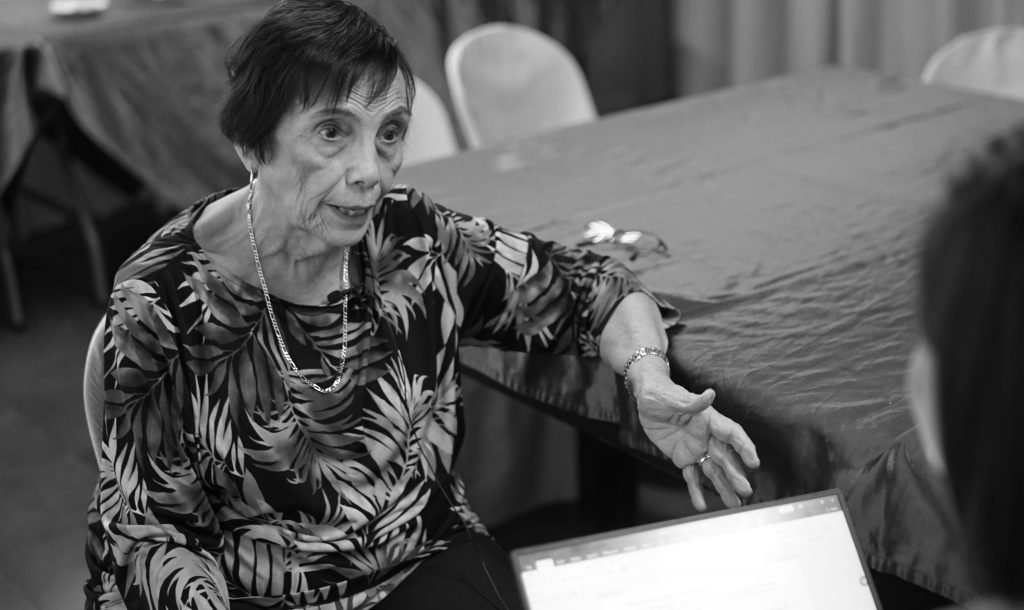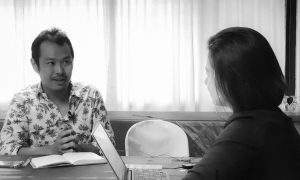In this last episode of the second series of Philippines beyond clichés, Associate Professor Nicole Curato talks to sociologist Dr Mary Racelis to unpack the idea that major cities like Manila should be decongested by moving the urban poor out and moving highrise developments and private capital in. Who has the right to live in the city and what role can facilitated community organisation that engages all residents of the city play in determining the shape and life of the city?
Nicole Curato [NC]: The cliché we’re talking about today is we need to decongest Manila. The push to decongest Manila has been alluring, a rallying cry for many middle class residents who find urban poor communities as eyesore to a mega city. We will unpack this cliché and draw on decades of empirical research on urban justice by no less than Professor Mary Racelis. Professor Racelis, welcome to Philippines Beyond Clichés!
Mary Racelis [MR]: Thank you! I’m very happy to be here!
NC: So, there are many misconceptions about the role of urban poor communities in mega cities like Manila. And I hear this a lot from middle class communities who say that we need to decongest Manila and one way to do it is to push the poor out of the city so we can build high-rise condominiums and more shopping malls. Where is this cliché coming from?
MR: Well, exactly what you’re saying, there are middle class groups that is promoting this that has learned what cities are supposed to be like based on kind of a European-American model. They don’t recognise or unwilling to recognise that Southeast Asian cities have always been different. The cities of the south are peopled cities. And they are people who occupy the streets, who live. That’s their everyday life. And I guess the main sentence there is that the city cannot run without that population which composes—the informal settlers alone—one-third of the population. The city would fall apart. It could because all the social services at the lower level or at the lower economic level are done by them.
NC: What are the trends when it comes to relations of let’s say local governments or private sector with urban poor communities in Manila? What have you observed in your decades of research?
MR: Well, when we started with organised urban communities, they happen to be mainly on national government land in Quezon City. So the target, in a way, was always the national government. And that has been, for years, the focus. And there are many things I could say about it but let me just skip to now, we realise it’s really local governments that they should have been addressing more and they’ve been doing that as the people who make decisions about them in their own homes. They are the ones who evict and so on. But there’s now a third component and that’s what you mentioned, the private sector. It’s really the private sector who are the urban planners, you might say, in that they control the whole land situation and urban poverty is directly related to availability of land for people to live. And so, however, the private sector has kind of been left out of the confrontational process because we’ve tended to look at national government and more recently, local government. But now we’ve realised with the kinds of displacements going on around Mega Manila, the outside parts which are private land, that it’s really private developers that are now causing tremendous problems of displacement and increasing poverty.
NC: So, help us understand this because it’s easy to have this impression that when, let’s say, land near rivers, prime real estate are ‘cleared’ (and I’m doing air quotes here, for our listeners) are ‘cleared’ of informal settlements, it’s beautiful! There’s a new shopping mall, there’s a park. What is problematic in that picture?
MR: Well, it’s that it doesn’t take into consideration those who have been displaced and moved somewhere where allegedly they’ll have a better life. But the evidence is very clear now, for many years that these out of town relocation sites for urban informal settlers from Manila just don’t work. Half of them, half of the people come back because they can’t survive there. And the ones who remain in hopes that they can build some kind of life find all kinds of problems, insufficient resources, insecurity now increasing, local governments which don’t want to take responsibility for them because they were foisted upon them. So, out of town relocation has not been a successful approach and so the urban poor communities that I know and work with are striving for onsite. In other words, if they can clear an estero but then build a condominium, it shows that if they would do onsite upgrading for the people who were there before as part of the social housing program, it can be done. It’s a question of who’s deciding who gets what. And we know that the powerful forces in society are the ones in control.
NC: I remember a colleague described this as, ‘master planning as planning for the masters.’
MR: [laughter] Very good! I hadn’t heard that. Very good!
NC: So, it’s really confronting, and asks, I guess, our urban poor communities to also start demanding for better treatment from the state and the private sector. But how is that possible if—but first of all, I think in your own work with Baseco communities, is it fair to assume that urban poor communities are powerless? That they can’t organise? That they can’t stand up for themselves when dealing with more powerful forces in society?
MR: Oh, not at all. I started working in this area during the Marcos administration when the Zone 1 Tondo Organisation was developed from community organising. And that was 50 years ago. Under martial law, they were able to gain the land that they were on which originally was intended for the port development and they were supposed to move somewhere else. But because of organising, they managed to stay and they’re still there although I don’t know how many generations later. And that model has spread throughout certainly Metro Manila, Cebu, and a few other places. It can be done but it has to have organising.
NC: What makes these organisations successful? What makes a good urban justice movement in the Philippines?
MR: Well, one is you have to have trained community organizers initially come in and help them go through how do you analyse your situation, what are the issues that most concern you, what can you do, what do you think you want to do something about, let’s propose what we’re going to do. And if it’s just going to be, I remember the one in Tondo Foreshore was, ‘We need water.’ But they won’t allocate more faucets, public faucets at the time because the contention the, 50 or 40 years ago was if you give any social services then people will stay. You want them out so you stall, you don’t want to give anything. So, they organise and really it was the women who were often the leaders in urban informal settlements. The tactic they worked out was they just took their laundry and their kids to the site of the LWUA, the water authority at the time. And there were faucets outside for cleaning and they all brought their laundry and their kids there and they began to do their washing right there on the premises of the water authority. Of course, the kids had candy and chocolates which had been provided and they were all over the place peeing and getting their hands on the desks of the officers who were completely taken by surprise, which was one of the tactics of this kind of organising. And finally, they said, ‘Alright, alright. Just go. We will provide.’ And they said, ‘When? Sign what date would you plan.’ And it happened. So, they can make those kinds of demand and usually they start with small, for us, look like small scale but for them, to get five more water taps when you only had one is—etcetera. So, but you keep building on that. Once people get a sense that they can do it, of personal capacity but they know it has to be with a group because if they are individuals, they can be attacked easily. But it has to be with a group always, that knows the issues, can articulate them, and that has happened over the years, that has spread very much.
NC: I think I really like that interpretation because it gives emphasis to the everyday efforts that women, especially, put in to build their political capacities and develop their voice to demand from the state that change doesn’t happen overnight. You mentioned the role of community organisers here. Can you talk to us more about that?
MR: Well, initially, in the Tondo Forshore, which was the first time they were brought in that way, these were, were brought in Herb White who was a disciple of Saul Alinsky of Chicago Stockyard organising and Herb White had been part of his group, Herb White then organised in Rochester the Kodak—I think, camera—workers and then he organised, he went to Korea where the Protestant Christians got him to do organising and that’s where people here, the organisers, Denis Murphy and some of the Protestant leaders who began to get quite ecumenical about poverty. I said, ‘Why doesn’t he come here and train Filipino community organisers in that conflict confrontation demand style? But peaceful, nonviolent organising.’ That was the whole pitch, that’s what makes this one different.
NC: Why is that important to emphasise? It’s nonviolent form of organising? To make a distinction with those who would probably cross the line in terms of making demands?
MR: Well, because it recognises that if you get into violent protest, of course at the Marcos time, that meant you must be a Communist. So, then you can get jailed and disappear. So, you have to have—well, for us it was nonviolent approaches because you can get some things done. Now, at the time, of course when the Left began to see how much was happening, they began to infiltrate and they did provide the Marcoses’ framework which for many of the urban poor, very aware organisers by that time—not organisers, but urban poor leaders, you know, were quite taken by then and then some of them began to get into more violent protests when there were clobbered by the Metrocom, jailed, that’s when Trining Herrera was, I think, picked up and tortured and so on. So, that’s reality. You have one thinking that you want to change the structure of society. And we would all agree that structural transformation is important. But at the same time, ordinary people’s everyday lives, you know, they maybe want something for their kids. They have short-term goals for the moment and you have to respond to that. That their lives visibly improve with themselves making the decisions.
NC: Which is a very valid position to have. I mean, it’s short-term but it’s valid because we’re talking about well-being, quality of life, and dignity when we are talking about this.
MR: Exactly.
NC: You mentioned about broad structural transformations and you’ve been doing this research for, you said, three decades or more now. What are the main transformations that you noticed in this kind of time, in urban poor community in Manila?
MR: One has been getting government structures like National Housing Agency, other agencies of the government, to begin to talk to people as people, as persons whom they’re supposed to serve rather than control or dispose of. So, through community organising, people have learned that you can make demands of that sector and more recently, what they began to put up what’s called people’s plans. And these were really quite structured and well thought out and they got the NGOs help, and the NGOs got the assistance of urban planners and engineers who helped them with the technical part usually for free as part of their own commitment. And when they present people’s plan, when finally NGOs enable them to get—and the church was very important there. You could always the bishop, you could call the president to say that they want to see him,
NC: As mediator.
MR: Yeah, yeah. Depends on which president but to call the National Housing Authority person to at least listen to their thing. And often that would happen and I’ve seen it happen that when authorities speak to people who are well-informed, who can answer questions, who know the data and that’s where sociologists coming in to help are useful, they’re so taken by surprise because they never expect that less educated people who are poor know anything. And when they learn from that direct confrontation that actually they know a lot and they have solutions. Even if they don’t accept them for a long time but they keep going and keep going. It’s a very slow process and it’s a crime that it’s taken 50 years just to get to where we are now with a few such places.
NC: So, Professor Racelis, what then is the ideal? I mean, what is an ideal mega city for you? How does it look like? What is this, can you paint a picture for us of a mega city where the poor have a space in the mega city, have rights to demand. Paint that picture for us. Especially, I think, for listeners who have this impression that they must be erased from the city, there’s not a good mega city if you have poor communities.
MR: No, first of all, they are citizens of the country so they have a right to be where they feel their lives can improve. And the way that society is set up, the ways they see improvements are going to be in the cities. And that’s, of course, all over the world, which is why we have such high urbanisation rates. So, there has to be, there have to be spaces for them because they are valid, they are citizens and they are valid contributors to the urban economy. What is missing are the services and secured tenure and housing. So, their government’s role with some private sector support, which is very difficult, but government’s role essentially is to provide those social spaces, social housing spaces for them. And control the land market and not just give everything to the developers because the developers say, ‘Well, that’s the problem of the local government. We pay all the fees and we did all of this. It’s not our role.’ But it is their role. If they want to make profits in this country, there has to be a more redistributive approach to investments. They can’t just do that by crushing have of the population. And if they want a peaceful business which is what they want, then they should not start creating situations where people have no other opportunities but maybe to get into more criminal activity, more protests, more violence, urban violence, drugs, you know. Twenty years ago I was already saying, ‘We are going to have a terrible problem with drugs because I saw it in Brazil. What happens in Latin America happens in the Philippines 20 years later.’ Indeed, you know?
NC: These are urban problems and we know about this when we read classical sociological texts, right? When societies change and urbanisation happens, these are standard problems that we face. Which I think brings me to the question of leadership. So, there has been a lot of attention with the role of mayors in shaping the way cities can progress. Our own president right now was a mayor of Davao City. There’s a lot of attention with the new Manila mayor Isko Moreno, the new Pasig mayor as well as someone who’s a bit more progressive, more in-tune with the needs of the poor. Well, I’d like to ask you about the role of leadership and governance more broadly with emerging issues with urban poor communities?
MR: Local governments really now have to take a much stronger position to recognise that a large part of their population, their voters, come from the urban poor communities, which is—and they coddle them, they coddle the poor because they want the votes. Yes, but poor people or the poor resident households have rights and can make demands. We know it’s possible because Jesse Robredo, of course, in Bicol was the example of a mayor who could recognise the value of organised people’s groups, would talk to them, would not always agree but they would negotiate, they would talk. And the great thing is [inaudible 18:18] it is to the women in the communities who become very strong in making those demands and when I asked a group of women once in Sampaloc, ‘Why are you the ones who seem to be in the leadership positions here?’ And they said, ‘Well, you know, one, because our husbands are looking for work or they’re not here. We’re here all the time, we know the issues, we worry about our children. So of course, when people and the organisers came and we realised we could do things and say things, of course we do it.’ And they sort of smile and they say, ‘Besides, now that we have learned how you negotiate, you have a proposal and you go with the proposal, you’re going to negotiate, make that demand, you never request, you demand.’ And we know that women in this country, we, we know how to negotiate. And she gave me an example. ‘You know, if I tell my husband, can you go to the market and buy fish, the store owner will say, twenty pesos, my husband will take twenty pesos out of his pocket if he has it and pay. If I go there and she says twenty pesos, I’ll say, ‘What?! No, ten,’ and then we negotiate and we bargain and it comes out fifteen or sixteen.’ She said, ‘That’s the way we handle the officials. We kind of know them already and who is more pliable and who is not and we strategise and we know how to negotiate and we make demands. If a man demands that the whole macho thing comes in and usually the male government person, they get into a fight, argument. But you know, women, we know how to deal with that so we know how far we can go and when we have to pull back and find some other strategy.’ She said, ‘That’s why we get where we get because we know how to manage relationships with the rich people.’
NC: Which I think is very fascinating because the opposite of that approach is to go with the strongman, to have someone run a city who is not consultative but someone who has the political will, right? These are values that are so alluring for some Filipinos as well so that do you think of that paradigm that’s quite the opposite of what you’re describing to me where officials are willing to listen and negotiate to women?
MR: Well, they’re not willing initially. It takes a long time and women keep pushing and pushing and they get annoyed to deal with them. You know, it’s that strategy of women wearing them down kind of thing. And so but that’s very much on the social side of local situations to be solved. In the case of the new mayors, we’re very optimistic but unfortunately, the president in his State of the Nation (SONA) spoke of, ‘We have to get the sidewalks cleared,’ and now that’s a requirement for every city or to every mayor. So, these progressive mayors so-called have decided or decreed everybody has to be swept off the streets. And these are ordinary, many of them women tindera, sellers, who are selling medium to small-scale stuff that is if not the major source of income if the husband’s not working because he can get employed now and then. It depends on construction. She’s the mainstay and now all of those women and some men of course, the sellers on the streets, the ones who get on buses to sell things, tricycle drivers or the padyak drivers, they have no place in his city, it seems. Well, he wants to clean up the sidewalk supposedly to improve traffic when of course, the number of cars using the streets, you don’t deal much with that other than the one day off thing. And yet the people on the sidewalks who are major—whose major income that is, are not given any other options. They’re told they can rent places in the market but the rentals are too high for them considering they’re too far from where they live, etcetera, etcetera. There’s just a lack of or unwillingness to comprehend the needs of urban poor and that’s why urban poor have to organise themselves to make those demands known. And NGOs help, church groups help, academics help but that paradigm has to change and that’s what I’m saying in this sociological convention, sociologists, anthropologists have to start being much more forceful about other paradigms of society.
NC: Exactly, because without that understanding, it’s just so easy to say, ‘The problem is lack of discipline.’ I mean even if you want to stay in the market, like what you said, if there are no market stalls, you’d really have to sell in the streets. I think I just also want to locate your research agenda on the importance of working with, not just studying, but working with urban poor communities. What is the passion and the logic behind this research agenda? Can you help us work out the body of work that you have specialising on this topic?
MR: Well, I think the way I came into this myself as a social scientist was I was doing regular research, the standard stuff. But the organisers of the community where I was, near where I was doing the research said, ‘Why don’t you come and help us instead?’ And when I saw what organising can do, and really I hate that word already, ’empower’ but to give people a sense of capacity and of dignity that they can be recognised as human beings and citizens. Total admiration of how they then charted their own destiny and I said I have to be a part of that and my part is help them do it not stand out as representing them or being their leader. Nothing like that but just being, walking the talk, being with them because you can help them move their own aspirations forward into action, because they’re taking action, which community organisers help them do and eventually, they get local community organisers, not from outside anymore. The local leaders become much more aware of how we run an organisation and the social scientists can then also write about this because if they trust you, they’ll be happy if you write about their situation. You can represent them if they trust you. And so, you can begin to write about this and say, ‘We need different ways of understanding the problem.’
NC: Absolutely. So, how many godchildren do you have in Baseco? [laughter] I think that’s always a good test of ethnographic work. How many godchildren do you have? How many beauty pageants have you judged?
MR: Oh, well… beauty contests, all of that. Yes, I’m often there doing those kinds of things.
NC: And your karaoke repertoire is also essential. [laughter]
MR: [laughter]
NC: Professor Racelis, unfortunately, time is not on our side so we have to summarise. So, in summary, do you think we need to decongest Manila by sending the poor outside the city?
MR: No, definitely not. The city will lose, its economy will collapse, and it will continue to do tremendous injustice to one-third, one-half of the citizenry of this society. I mean what is a country for? What is a government for? It’s for all its people. And so they can’t keep giving all the benefits to the private sector, so-called, without making sure that some of the profits that are engendered go to the poor. Can I give you just one last example? In the Cebu reclamation, I just heard from Bimbo Fernandez who was a city administrator and who was a community organiser and a very strong people person, that when he was city administrator, they did a land reclamation, they got a loan from Japan at very concessional rates and they [inaudible 26:59] but they didn’t sell all of it immediately. They sold one portion which they could have paid the loan but they decided to spread it out and because the value—well, alright, so that land was used by private sector investments but the city owned the money, the land, so they used the money for massive social services distribution. So, if a local government really wants to have a thriving and successful city which is not violent, where you don’t have people dying, children in misery, then you have to think of the city as a whole and how the better of parts can share, through the government efforts, bring about some of the benefits that the private sector can bring to the benefit of the large majority poor because in the end, if their situations improve and they have better housing and better health, you will have a real city, a city of people who are happy people.
NC: Well, I think it’s great to end on that note, to discuss the politics of possibilities. So, thank you, Professor Racelis for inspiring us!
MR: Oh, you’re very welcome! Anyone who gives me a chance to talk about my favourite subject.
[END] Facebook
Facebook  Twitter
Twitter  Soundcloud
Soundcloud  Youtube
Youtube  Rss
Rss 



